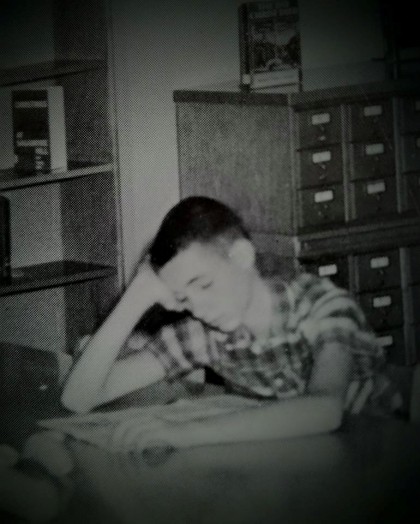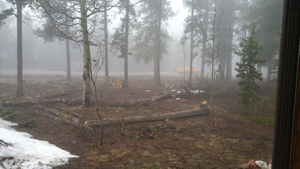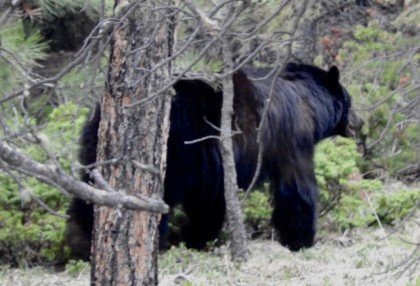Spring Recovery Moon

Kate’s sister BJ comes tomorrow for the weekend. She and her s.o. Schecky were out here in September, a planned visit to see our house, but they came the day Kate went into the hospital. They took me to a Japanese restaurant for sushi the night Kate had her hemicolectomy. It was a kind thing to do. I needed the break. Look forward to seeing her.
Had lunch with Alan Rubin yesterday. He’s auditioning for a part in Cabaret, another Ovation West production. You might recall he was in “Funny Girl” which Kate and I saw last fall. He’s taken to retirement by becoming a performer. Taking voice lessons, learning music theory, and this year becoming President of the Ovation West board. He and I were teaching the religious school class until I had to quit due to too much stuff going on at home. A good friend.
John came by and fixed my john. Apparently I blew the seal plunging out a clog. Geez. Water under pressure is powerful. Just ask all those folks in Nebraska. Interesting article about the one guy who manages all the Army Corps of Engineers dams on the Missouri River. He chooses whether to let dams fail or send more water downstream to already flooded farms and towns. Another one the next day wrote about the 25 states under risk for extreme flooding as this winter’s cold begins to loosen, melt snow and ice. When a severe winter like this last one thaws, if it comes too soon, the water hits frozen land. No buffer in the land, just like flooding a parking lot.

Up here getting a tradesperson out to the house, really tradesmen since I’ve not yet encountered a female plumber, electrician, handyman (though I’m sure they exist somewhere), often depends on a personal relationship. Herb, of H2O plumbing, ignored my phone message. He didn’t remember that I was the guy who lived in Andover when he lived in Nowthen. When I got him on the phone, he remembered and got a guy over here in two hours. Like living in a small town.
The mountain way. Had to take the garbage and recycling bins back inside the garage. The bears are awake. Bears can smell food, the Colorado Dept. of Natural Resources says, from five miles away. I still don’t let the dogs out at dawn or dusk because of mountain lion predation. All the critters are hungry as the snow melts, food’s been a scarce resource for a while now, just like every winter.

Another interesting part of the mountain way, driving up here. Roads in the mountains, except for I-70 are neither straight nor multiple lanes. Hwy 285, a divided four lane now past Conifer, devolves into a curvy up and down two lane (with the occasional passing lane) as it heads toward Bailey and Park County. The rest are two lane, no passing, winding. No sight lines beyond the next curve up and down.
It took a while to learn, but there is a code. Leave the person in front of you a healthy distance since deer or elk might be standing in the road around the next bend. Don’t go too fast or too slow. Stay alert. If somethings ahead, either wildlife or Jeffco sheriff’s deputies, blink your lights at oncoming traffic. This confused me at first since it was the signal you had left your lights on back in the old days before car lights turned off by themselves.
Two sorts of drivers violate this unspoken code. The first, most of us grant license, are tourists. We have two spots on Black Mountain Drive/Brook Forest Drive (same road), Upper and Lower Maxwell Creek, that draw crowds from the Denver area each nice day. There are also folks staying in Evergreen in one of the many cabins or motels who wander out of town for a drive in the mountains. Many of these drivers brake at every curve, even going uphill, which is silly since the mountain will brake for you if you let up on the gas.

The second type are residents who have to get down the mountain thirty seconds faster than you do. They’re the ones who’ll put you in danger. I haven’t seen it, but others write of people who pass them. Passing on these roads is like spinning a roulette wheel with your life and somebody else’s. Others will crowd up on your bumper. As if that changes the physical reality we both face. Flick their lights in your mirror. You know.
Mostly driving here is sedate since the roads don’t really offer a safe alternative. I like that since it gives me a chance to savor the rocks, the trees, the peaks and valleys while moving at a speed safe enough even if I encounter a bouncy young fawn or calf or a whole herd of elk.




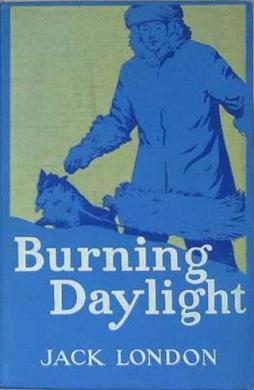 Turns out the Fox River Valley was not that place. The Fox River which runs from the Green Bay through Appleton and finally into Lake Winnebago had no available oxygen for aquatic life thanks to years of dairies and paper mills, two of the worst polluters, dumping effluent. But you could see this north from there. In the Fox River Valley it manifested itself in a tortured way through snowmobile culture and the annual ritual of the deer hunt. Both were violent and dangerous. On winter nights the lights of snowmobiles rake the roadways and countrysides as riders drive their vehicles alongside the roads from bar to bar for a shot and a beer. It was often said that grudges got settled during deer season.
Turns out the Fox River Valley was not that place. The Fox River which runs from the Green Bay through Appleton and finally into Lake Winnebago had no available oxygen for aquatic life thanks to years of dairies and paper mills, two of the worst polluters, dumping effluent. But you could see this north from there. In the Fox River Valley it manifested itself in a tortured way through snowmobile culture and the annual ritual of the deer hunt. Both were violent and dangerous. On winter nights the lights of snowmobiles rake the roadways and countrysides as riders drive their vehicles alongside the roads from bar to bar for a shot and a beer. It was often said that grudges got settled during deer season. Wisconsin was a bad experience for me. Judy and I had married at 21 and 17. I had graduated from college that spring and had no idea what to do next. So. Get married. By Appleton neither one of us were sure why we’d said yes to the other. The long winter nights found us drinking beer by the case and playing sheepshead with Judy’s family. Her father, a convinced alcoholic, and I, just getting started in my addiction, didn’t really get along. He was a snowmobile racer, a deer hunter, an ink salesman and a Packer fan. I had little interest in any of those things. Our only common ground was his daughter.
Wisconsin was a bad experience for me. Judy and I had married at 21 and 17. I had graduated from college that spring and had no idea what to do next. So. Get married. By Appleton neither one of us were sure why we’d said yes to the other. The long winter nights found us drinking beer by the case and playing sheepshead with Judy’s family. Her father, a convinced alcoholic, and I, just getting started in my addiction, didn’t really get along. He was a snowmobile racer, a deer hunter, an ink salesman and a Packer fan. I had little interest in any of those things. Our only common ground was his daughter.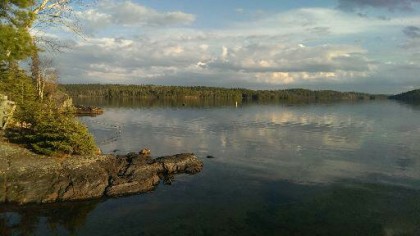
 In addition to cooking, the sumi-e (ink brush painting), and working out, I mentioned the possibility of a greenhouse. Expensive, so we’ll see about that. But. I began reading a book I’ve had for a while,
In addition to cooking, the sumi-e (ink brush painting), and working out, I mentioned the possibility of a greenhouse. Expensive, so we’ll see about that. But. I began reading a book I’ve had for a while,  Buddy Bill Schmidt will recognize the quote that begins the chapter on Soil: “See what you’re looking at.” Carey Reams, an unlikely looking radical, used to say this. He was the founder of the outfit from which I purchase soil additives, the High Brix Gardening folks in Farmington, Minnesota. He contended, as do many now in the farm-to-table world, that agriculture went astray long ago, moving toward products that fit mechanized food production rather than human nutrition.
Buddy Bill Schmidt will recognize the quote that begins the chapter on Soil: “See what you’re looking at.” Carey Reams, an unlikely looking radical, used to say this. He was the founder of the outfit from which I purchase soil additives, the High Brix Gardening folks in Farmington, Minnesota. He contended, as do many now in the farm-to-table world, that agriculture went astray long ago, moving toward products that fit mechanized food production rather than human nutrition. The vast wheat fields of the Great Plains grow an annual wheat, two varieties that work well in steel rolling mills. Not only have these annual crops destroyed the ten feet or more of top soil that buffalo and deeply rooted grasses developed there, but the steel mills which make this crop profitable separate the germ and bran from the kernel, leaving only fluffy white flour. What’s bad about that? Well, turns out the nutrition in wheat lies in the germ and the bran.
The vast wheat fields of the Great Plains grow an annual wheat, two varieties that work well in steel rolling mills. Not only have these annual crops destroyed the ten feet or more of top soil that buffalo and deeply rooted grasses developed there, but the steel mills which make this crop profitable separate the germ and bran from the kernel, leaving only fluffy white flour. What’s bad about that? Well, turns out the nutrition in wheat lies in the germ and the bran. I guess this is the native Midwesterner in me. I grew up driving past corn fields, pastures filled with Holsteins and Guernseys, pigs and beef cattle. The Andover gardens, the orchard and the bees, along with our small woods satisfied this part of my soul. I’m going to investigate local CSA’s, see if that’s a route back into this world. We have to buy groceries anyway, so why not from folks who share a philosophical position close to my own.
I guess this is the native Midwesterner in me. I grew up driving past corn fields, pastures filled with Holsteins and Guernseys, pigs and beef cattle. The Andover gardens, the orchard and the bees, along with our small woods satisfied this part of my soul. I’m going to investigate local CSA’s, see if that’s a route back into this world. We have to buy groceries anyway, so why not from folks who share a philosophical position close to my own.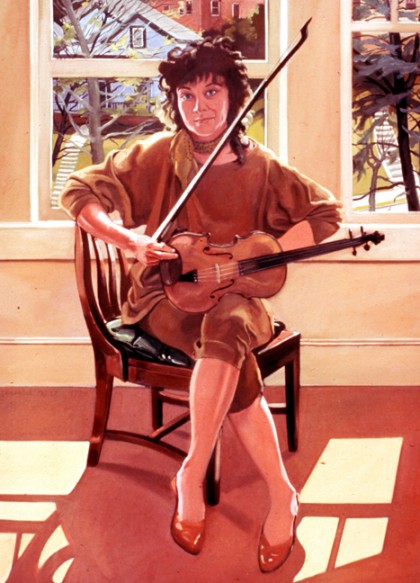

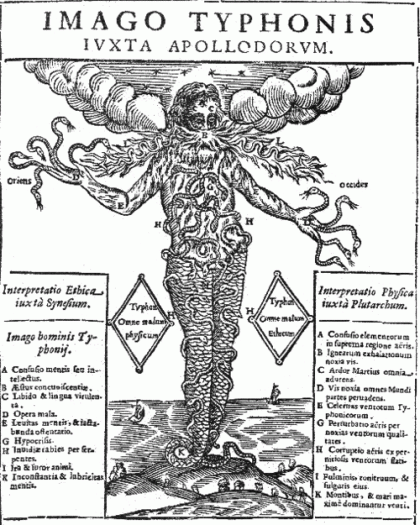 It was a week of this sort of activity, getting ready for the storm, catching up on errands. My exercise, Jennie’s Dead work suffered, but my choice. This week I’m back at all of that, going to On the Move Fitness on Thursday for a new workout.
It was a week of this sort of activity, getting ready for the storm, catching up on errands. My exercise, Jennie’s Dead work suffered, but my choice. This week I’m back at all of that, going to On the Move Fitness on Thursday for a new workout.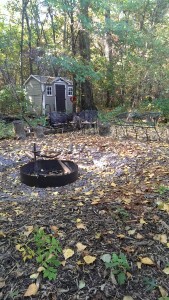
 If you’re an alcoholic like I am, you learn early in treatment that the geographical escape won’t work. Wherever you go, there you are is the saying. It’s true that the addictive part of my personality follows me from place to place as well as through time. Even so, this move to Colorado has awakened me to an unexpected benefit of leaving a place, especially ones invested with a lot of meaning.
If you’re an alcoholic like I am, you learn early in treatment that the geographical escape won’t work. Wherever you go, there you are is the saying. It’s true that the addictive part of my personality follows me from place to place as well as through time. Even so, this move to Colorado has awakened me to an unexpected benefit of leaving a place, especially ones invested with a lot of meaning. While it’s true, in the wherever you go there you are sense, that these memories and social roles, the feeling of a continuous self that lived outside Nevis, in Irvine Park, worked at the God Box on Franklin Avenue remain, they are no longer a thick web in which I move and live and have my being, they no longer reinforce themselves on a daily, minute by minute basis. And so their impact fades.
While it’s true, in the wherever you go there you are sense, that these memories and social roles, the feeling of a continuous self that lived outside Nevis, in Irvine Park, worked at the God Box on Franklin Avenue remain, they are no longer a thick web in which I move and live and have my being, they no longer reinforce themselves on a daily, minute by minute basis. And so their impact fades. This is obvious, yes, but its effect is not. This unexperienced territory leaves open the possibility of new aspects of the self emerging triggered by new relationships, new roles, new physical anchors for memories. Evergreen, for example, now plays a central part in our weekly life. We go over there for Beth Evergreen. We go there to eat. Jon and the grandkids are going there to play in the lake this morning.
This is obvious, yes, but its effect is not. This unexperienced territory leaves open the possibility of new aspects of the self emerging triggered by new relationships, new roles, new physical anchors for memories. Evergreen, for example, now plays a central part in our weekly life. We go over there for Beth Evergreen. We go there to eat. Jon and the grandkids are going there to play in the lake this morning.